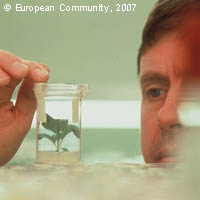Politicians trust scientists, but are not making use of research results
Politicians have more trust than the general public in the work of researchers, but nonetheless make use of scientific research results all too rarely, according to a study by the Swedish organisation Vetenskap and Allmänhet. The study involved a survey of 595 members of parliament, leading regional politicians and members of Stockholm city Council. In addition, an in-depth series of essays was published following discussions with nine researchers and nine politicians on how they see the relationship between the two groups. More politicians than members of the public believe that both scientific developments and technical developments have made life better for ordinary people, while significantly more politicians believe that research will be beneficial for both economic growth and climate change. Some 83% of politicians think that research will contribute to increased economic growth in Sweden within the next 10 years, compared to 57% of the general public. Similarly, 78% of politicians think that research will slow down climate change within the next 10 years, while only 55% of the general public are equally optimistic. Looking at individual policy areas, politicians believe that research results influence policy in health more than in any other area. Health is followed by energy and the environment, education, and then transport, communications and infrastructure. Three-quarters of politicians interviewed claimed that they seek out scientific information to help them make political decisions. But paradoxically, it seems that politicians seldom look for research information within the areas that they believe to be the most influential. Only 16% frequently make use of medical research results. The figure rises slightly for technology and natural sciences (21%), and then again for the social sciences and humanities (33%). Both politicians and researchers appear united on the need for them to work together more closely. Both sides are however aware of their different cultures and the difficulty that this can lead to in understanding the other's point of view. 'What researchers and politicians need are more meeting places, new and different ways of interacting, more contact and dialogue, and easy to digest summaries of information. Together these measures can help to drive the two worlds closer, and to make research easier for politicians to access and understand,' states the report. One such scheme does exist in the UK, and was last year extended to EU level on a pilot basis. The Royal Society's MP/MEP-Scientist pairing scheme began in the UK in 2001, and has successfully paired over 100 MPs with scientists. The objective is that the scientists involved learn more about the political process, and the type of information that politicians need, while politicians learn more about the complexities of science, and how researchers operate. The EU pilot scheme has paired seven MEPs with scientists from their constituencies. If successful, the programme will be extended to MEPs and scientists from around the EU.
Countries
Sweden



